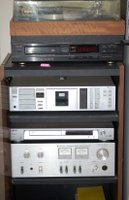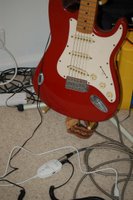Audiophiles are the only people who can hear well #audio

I too was a semi-audiophile, once. I know what it's like to set high expectations on music quality and to keep on justifying my high-expense actions based on "sunk costs". Once you have made that investment in time, pride and money there's no going back. Well, so I thought. In fact you don't have to go all the way back, just some of the way back and then forwards - but in a new way. Like dispensing with old-style toe-clips and straps on your bike pedals and moving onto clipless pedals - it's a testing transition at first but once you have discarded the old ways it's much, much better.
OK, my story starts almost 30 years ago. I bought some gear that was recommended by a sound engineer who had worked at Olympic Studios in London in the late '60s. (He recalled the Rolling Stones as being rather 'smelly' at their sessions, btw.) It was good stuff. A pair of big, bad Acoustic Research AR93 speakers, a Sansui amp and a TEAC turntable with an expensive diamond stylus. I added a Nakamichi tape deck a bit later. The weakest link was the vinyl. I reckon I spent more on imported pressings than I did on the audio hardware, and it still wasn't good enough. Vinyl is great stuff in theory but even your lightest needle tracking your finest groove will cause wear and tear to the record whilst suffering from all of the other mechanical problems allied to mass, velocity and force. And we haven't even mentioned static and dust. Lo, and if the pressing is not perfect to begin with then you are behind the 8-ball immediately. Physics actually matter and rotating masses and direct contact do not a happy couple make.
So - objectively, if anything or anyone is truly objective - vinyl is actually rubbish to use for audio, being a kludge, the audio equivalent of brute-force engineering (like a derailleur on a bicycle, it can work well - but it's not exactly elegant).
And so I discovered the Sony CD player in about 1985 and my life changed. Yes, some CDs are as bad as bad vinyl - the sound from my CD copy of the Who's Quadropenia is appallingly muddy, whereas my vinyl copy is bright and perfect. I blame that on the quality of the master and a poor effort to transfer from original analog to digital. Done right, it works fine - but it must be done right.
For me, CD killed vinyl; although I do still like the big sleeves and the artwork. And it's kinda fun in a retro way to occasionally do it "the old fashioned way", just like I prefer manual gearboxes to automatics. But the warped discs, the scratches... no thanks.
Around the same time as the CD player arrived I also got into personal computers. One thing led to another and now I'm thoroughly sold on highly compressed sound files and digital manipulation of both sound and vision. For an analogy look at art: I used to paint and draw with oils and pencils, now I use computer tools like Photoshop and the like. I used to process my own film and develop prints in the darkroom, but now I don't. It's not just cleaner, easier and faster, it's also better on the computer. I have more control, not less. And less waste. Sure, you can wallow in the whole complexity and difficulty of the old ways and impress your kids with your skillful, demented suffering, but there's no way it's coming back - we are going forward!
So it is with audio. You can still spend fabulous amounts on high-end audio gear - and good luck to you if that's the case - but decent sound is available with little effort and at low cost, and it's better. You can control the sound, be it music or just "audio" and manipulate - or create - it to your taste. With less waste.

Of course audiophiles will still say "but something is lost with digital translation" and "we can get a better sound out of high-end specialist gear" and "it should be reproduced faithfully, as the musician intended" and of course they are right on all counts. You can always do "better" and remain "faithful", even with digital, if that's your philosophy. But it's not necessarily the only way to think, is it? Now I'm not advocating lousy, buzzy, poorly reproduced sound, just that digital is the clear way to go in terms of empowerment of both the musician and the listener. And that an acceptable balance can easily be found that delivers good, crisp audio from a computer (or MP3 player or whatever) without undue compromise. If you are a musician and have tried Anvil Studio or Cubase or even just a virtual amp on your PC you'll know what I mean. Digital opens new audio doors. And you don't have to spend a bucket load in the process.
Labels: audiophiles, Digital audio, music, virtual amplifier









0 Comments:
Post a Comment
Links to this post:
Create a Link
<< Home